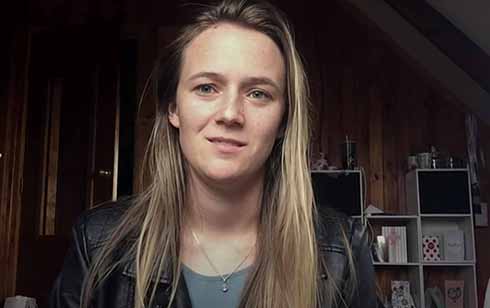 THE GIRL ON THE BRIDGE, New Zealand, 2019. Featuring Jazz Thornton. Directed by Leanne Pooley. 90 minutes, Rated M (Suicide themes and coarse language)
THE GIRL ON THE BRIDGE, New Zealand, 2019. Featuring Jazz Thornton. Directed by Leanne Pooley. 90 minutes, Rated M (Suicide themes and coarse language)
A significant film.
This is a New Zealand story but it is also a universal story. Its theme is suicide, especially suicide by the young, the pressures, their motivations, their desperation, as well and is the impact on those they leave behind. While this theme has been explored in documentaries and in feature films, this treatment is quite distinctive. It is due to a young woman, Jazz Thornton.
We are introduced to Jazz and learn immediately that she had made 14 suicide attempts. But, taking her life seriously, she moved on but not only for her own life but for all those in similar situations, launching a personal crusade. She set up an organisation, Voices of Hope. She also set out to make a web series, based on her contact with a young woman, Jessica, who did take her own life, Jazz caught up but unable to save Jessica. Ultimately, she did produce the web series – which is available online.
Jazz Thornton is quite a screen presence. She is immediately engaging, the audience responding well, liking her, appreciating her directness and candour, but also charmed by her genial and outgoing personality. We are compelled to listen to her, to take her concerns very seriously, to being involved in her crusade.
While, we learn Jazz’s story, this is not a narrative about her life, her suicide attempts and the reasons for her changing her life. Rather, it is a documentary showing her collaborating with media producers, discussing a web series called Jessica’s Tree, the planning, how it would work, the communication issues, the ethical issues, the legal issues… In fact, the narrative of the film and its style is something like fly-on-the-wall observation of Jazz and her co-workers, but with also some talking straight to camera.
We are carried along by Jazz’s enthusiasm, her way with words, her extremely expressive face, seeing her giving various talks, to school children, a Ted Talk, articulate, authentic. Jazz is also a convincing fundraiser.
Quite an amount of the film is given to interviews with Jessica’s parents, sometimes overcome with emotion, sad memories and regrets, but believing in Jazz and what she is trying to do, ultimately present at the screening of the web series. There are also interviews with a number of young people who knew Jessica.
Throughout the film, in her talks, in discussions with the producers (especially the two women who not only give her support but clarify her thinking and contribute to her ideas), in her observations about her own experiences, Jazz makes a lot of sense. She declares she is not trying to modify behaviour as such but enable a person to change their belief, their belief about themselves, about life. And she is very strong in condemning those who want to reassure by saying “it’ll be okay”.
Suicide, mental illness, depression, seem to be increasingly prevalent in the world today. Some statistics are frightening. But, here is a young woman, speaking from experience, becoming both an educator and a crusader promoting more knowledge, more understanding about suicide.
This film is certainly a significant resource for any group involved in suicide prevention. It is also a strong resource for parents, educators, and, hopefully, by anyone with depression and contemplating suicide who might get the opportunity to watch it. (It is worth Googling Jazz Thornton as well as Jessica’s Tree for articles and video material.)
The energetic Jazz Thornton continues her work, her vocation.
Heritage Films / Rialto
In selected cinemas and VOD
Peter Malone MSC is an associate of Jesuit Media